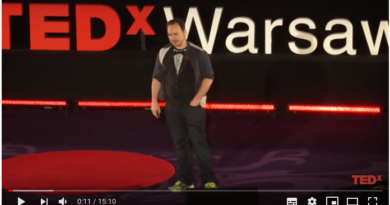Crédito da Imagem: Clark Young on Unsplash
Um dos mitos que cercam o aprendizado de idiomas é que é necessário possuir um talento natural, uma habilidade inata, ou um gene de idiomas. Neste vídeo,Lýdia Machová nos explica que isto não corresponde à realidade, e ela baseia esta informação em sua experiência pessoal como mentora de estudantes de idiomas.
Lýdia Machová é uma poliglota e mentora linguística que aprendeu 9 línguas sozinha, 7 das quais mantém em um nível fluente. Já se apresentou na prestigiosa conferência TED em Nova York, em vários eventos internacionais e organizou uma das maiores conferências do mundo para poliglotas na Eslováquia.
Lýdia possui um canal no Youtube chamado Language Mentoring onde compartilha diversas técnicas que ela própria usa para aprender rapidamente cada vez mais idiomas.
| Audio | |
|---|---|
Normal | Slow |
| English Transcript | Tradução |
| Whenever I tell people that I speak seven languages and I'm learning my ninth one right now, they always say: "Oh, you're so talented, you're so lucky, I wish I had the talent that you have." | Sempre que digo às pessoas que falo sete línguas e estou aprendendo a nona agora, elas sempre dizem: "Ah, você é tão talentosa, tem tanta sorte, gostaria de ter o talento que você tem." |
| But the question is: is it really the talent that helps people learn languages and is talent important to learn a language? Can people learn a language if they are not talented? | Mas a questão é: é realmente o talento que ajuda as pessoas a aprender línguas e é o talento importante para aprender uma língua? As pessoas podem aprender um idioma se não forem talentosas? |
| I personally think that if I have some talent for languages, that it helps me, maybe, 15% more than other people who are not talented. | Eu pessoalmente acho que se eu tiver algum talento para idiomas, isso me ajuda, talvez, 15% mais do que outras pessoas que não são talentosas. |
| That means I need to work just 15% less than those who are not talented and that's not really very much, is it? | Isso significa que preciso trabalhar apenas 15% menos do que aqueles que não são talentosos e isso não é muito, não é? |
| I really believe it, because I've been working with people who have been thinking for twenty, thirty years, that they are not talented for languages because they've been struggling, they're learning on and on, they try different methods and nothing works. | Eu realmente acredito nisso, porque tenho trabalhado com pessoas que pensam, há vinte, trinta anos, que não têm talento para línguas porque se esforçam, estudam continuamente, tentam métodos diferentes e nada funciona. |
| And then they change something in their learning and suddenly it works, suddenly they can learn a new language or even two or three, and suddenly they are talented. | E então elas mudam algo em seu aprendizado e de repente funciona, de repente elas conseguem aprender um novo idioma ou mesmo dois ou três, e de repente elas são talentosas. |
| So, I really think it's not about the talent, it's about the approach that we have to language learning. | Então, eu realmente acho que não é sobre o talento, é sobre a abordagem que temos para o aprendizado de idiomas. |
| And to be quite honest, I think that for many people, not being talented is actually just an excuse, because it's quite comfortable to say: "Oh well, I'm not one of those talented ones, I won't even try, I won't bother, because I cannot learn a language, right? | E para ser sincera, acho que para muitas pessoas, não ser talentoso é, na verdade, apenas uma desculpa, porque é bastante confortável dizer: "Bem, não sou um desses talentosos, nem vou tentar, não vou me incomodar, porque não consigo aprender um idioma, certo? |
| But I can assure you that every every one can learn a language. | Mas posso garantir que todas as pessoas podem aprender um idioma. |
| I honestly believe that. | Eu honestamente acredito nisso. |
| Because if you even think about that, we have all learned our mother tongue, right? | Porque se você parar para pensar, todos nós já aprendemos a nossa língua materna, certo? |
| There are not people who are not talented enough to learn a [?], they know it a little bit. | Não existem pessoas que não sejam talentosas o suficiente para aprender um [?], elas sabem um pouco. |
| I mean, we all speak our mother tongue pretty well, we don't have any problem communicating. | Quer dizer, todos nós falamos nossa língua materna muito bem, não temos nenhum problema de comunicação. |
| Basically, if we do the same for any other language, if we learn in the same way, in a natural way, where we hear the language many times, in many different contexts, then we can learn any other language, just in the same way. | Basicamente, se fizermos o mesmo para qualquer outra língua, se aprendermos da mesma forma, de forma natural, onde ouvimos a língua muitas vezes, em muitos contextos diferentes, então podemos aprender qualquer outra língua, exatamente do mesmo jeito. |
| But of course, it takes some practice and discipline, some time spent with the language. | Mas, claro, é preciso alguma prática e disciplina, investir algum tempo estudando o idioma. |
| So, if you have been thinking that you are not talented, then think twice, because maybe you have just not found the right approach which will help you to learn the language. | Então, se você tem pensado que não é talentoso, pense duas vezes, porque talvez você simplesmente não tenha encontrado a abordagem certa que o ajudará a aprender o idioma. |
| I like a saying which says, "hard work beats talent if talent doesn't work hard." | Gosto de um ditado que diz: "O trabalho árduo vence o talento se o talento não trabalhar duro". |
| And this is so true because you can be the most talented person in the world, if you don't really do something about it, if you don't spend time learning the language, you will never speak it. | E isso é tão verdade porque você pode ser a pessoa mais talentosa do mundo, se não fizer nada a respeito, se não investir tempo aprendendo a língua, você nunca vai falar. |
| It doesn't just come upon you, you will not just speak the language, suddenly, miraculously one day. | Isso não acontece por acidente, você não vai falar a língua um dia, de repente, milagrosamente. |
| You really have to work hard and that's exactly what I have done with all my languages. | Você realmente tem que trabalhar duro e isso é exatamente o que tenho feito com todos os meus idiomas. |
| I usually spend two years learning every one of them, and that's, that's what it takes. | Normalmente passo dois anos aprendendo cada um deles, e isso é o que é necessário. |
Contagem de palavras
A tabela abaixo exibe as palavras encontradas neste vídeo bem como o número de vezes em que aparecem.
Veja também: Para que serve esta tabela?
| Freq. | Palavra | Freq. | Palavra | Freq. | Palavra |
|---|---|---|---|---|---|
| 19 | I | 16 | the | 14 | you |
| 13 | that | 13 | not | 13 | language |
| 13 | and | 11 | talented | 11 | it |
| 10 | learn | 10 | have | 9 | if |
| 9 | a | 8 | we | 8 | to |
| 8 | they | 8 | are | 7 | talent |
| 7 | people | 7 | because | 6 | really |
| 6 | learning | 6 | just | 6 | is |
| 6 | in | 6 | can | 5 | think |
| 5 | so | 5 | one | 5 | languages |
| 5 | for | 4 | work | 4 | who |
| 4 | that's | 4 | suddenly | 4 | speak |
| 4 | right | 4 | been | 4 | about |
| 3 | with | 3 | will | 3 | way |
| 3 | then | 3 | some | 3 | same |
| 3 | other | 3 | of | 3 | many |
| 3 | it's | 3 | hard | 3 | every |
| 3 | even | 3 | don't | 3 | but |
| 3 | any | 3 | all | 2 | you're |
| 2 | years | 2 | works | 2 | won't |
| 2 | which | 2 | what | 2 | well |
| 2 | two | 2 | try | 2 | tongue |
| 2 | time | 2 | those | 2 | thinking |
| 2 | than | 2 | takes | 2 | spend |
| 2 | something | 2 | say | 2 | quite |
| 2 | our | 2 | or | 2 | on |
| 2 | oh | 2 | my | 2 | mother |
| 2 | maybe | 2 | I'm | 2 | helps |
| 2 | doesn't | 2 | do | 2 | different |
| 2 | believe | 2 | be | 2 | approach |
| 1 | world | 1 | working | 1 | wish |
| 1 | where | 1 | whenever | 1 | very |
| 1 | usually | 1 | upon | 1 | twice |
| 1 | twenty | 1 | true | 1 | times |
| 1 | three | 1 | this | 1 | thirty |
| 1 | they've | 1 | they're | 1 | there |
| 1 | them | 1 | their | 1 | tell |
| 1 | struggling | 1 | spent | 1 | seven |
| 1 | says | 1 | saying | 1 | question |
| 1 | problem | 1 | pretty | 1 | practice |
| 1 | personally | 1 | person | 1 | ones |
| 1 | now | 1 | nothing | 1 | ninth |
| 1 | new | 1 | never | 1 | need |
| 1 | natural | 1 | much | 1 | most |
| 1 | more | 1 | miraculously | 1 | methods |
| 1 | means | 1 | mean | 1 | me |
| 1 | lucky | 1 | little | 1 | like |
| 1 | less | 1 | learned | 1 | know |
| 1 | I've | 1 | important | 1 | honestly |
| 1 | honest | 1 | help | 1 | hear |
| 1 | had | 1 | found | 1 | excuse |
| 1 | exactly | 1 | enough | 1 | done |
| 1 | discipline | 1 | day | 1 | course |
| 1 | contexts | 1 | communicating | 1 | comfortable |
| 1 | come | 1 | change | 1 | cannot |
| 1 | bother | 1 | bit | 1 | being |
| 1 | beats | 1 | basically | 1 | assure |
| 1 | an | 1 | always | 1 | actually |








